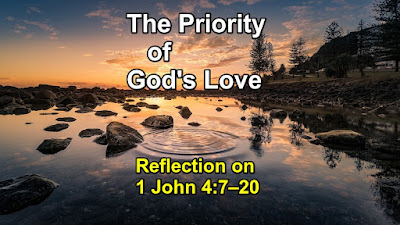The Priority of God’s Love: A Reflection on 1 John 4:7–20
1 John 4:7–20 is a profound passage that reveals the centrality of God’s love in the life of a believer. This text explores the origin, nature, and implications of divine love, presenting it as the foundation for human relationships and a defining attribute of God Himself. Verses 7 and 19, in particular, highlight the priority of God’s love and provide a theological framework for understanding how His love shapes our lives.
God’s Love as the Source of All Love (Verse 7)
Verse 7 states, “Beloved, let us love one another, for love is from God, and whoever loves has been born of God and knows God.” This verse establishes that love originates from God. Love is not merely a human emotion or a cultural ideal but a divine attribute intrinsically tied to God’s nature. God is the source and definition of love, and this truth has profound implications for those who belong to Him.
The exhortation to “love one another” is not a suggestion but a command rooted in the believer’s relationship with God. Those who are “born of God”—those who have experienced spiritual rebirth through faith in Christ—exhibit love as evidence of their connection to the divine source. To love is to reflect the character of God and to demonstrate that one “knows” Him in a personal and transformative way. Thus, love is not optional for Christians; it is a central mark of their identity in Christ.
God’s Initiating Love (Verse 19)
Verse 19 declares, “We love because he first loved us.” This verse emphasizes the priority and initiating nature of God’s love. Human love is always a response to the love that God has already shown. Without His love, we would neither understand what love truly is nor have the capacity to love others genuinely.
God’s love is unconditional, self-giving, and sacrificial. This is most clearly demonstrated in the life, death, and resurrection of Jesus Christ. As verse 10 explains, “In this is love, not that we have loved God but that he loved us and sent his Son to be the propitiation for our sins.” God’s love is proactive, reaching out to humanity even when we were undeserving. The order is crucial: God loves first. His love is the foundation and the motivation for all Christian love.
The Priority of God’s Love in Context
The broader context of 1 John 4:7–20 expands on the significance of God’s love:
God’s Love Defines His Nature (Verses 8 and 16): Twice in this passage, John declares that “God is love.” This means that love is not just one of God’s attributes but central to His essence. Everything He does flows from His love. To know God is to encounter His love.
God’s Love Precedes Human Response (Verses 10 and 19): Our ability to love—both God and others—depends entirely on God’s prior action. He took the initiative by loving us first, demonstrating what true love looks like and enabling us to respond in kind.
God’s Love Is Perfected in Us (Verses 12 and 17): As believers love one another, God’s love is “perfected” or brought to its intended goal. This does not imply that God’s love is incomplete but that it reaches its full expression in the mutual love of His people. In this way, believers become vessels of God’s love, demonstrating His presence in the world.
God’s Love Drives Out Fear (Verse 18): God’s perfect love provides security, freeing believers from the fear of judgment. This assurance allows them to love freely and boldly, knowing that they are deeply and unconditionally loved by God.
Application: Living in the Priority of God’s Love
The priority of God’s love has several practical applications for believers:
Motivation for Loving Others: Believers are called to love others not out of duty or self-interest but as a response to God’s overwhelming love. This love transforms hearts, enabling believers to love unconditionally and sacrificially.
Reflection of God’s Nature: By loving one another, Christians reflect God’s nature to the world. This love is a practical demonstration of the gospel and a witness to God’s character.
Humility and Gratitude: Recognizing that God loved us first fosters humility. We cannot boast in our love for God or others; instead, we give thanks for His initiating grace. Our love is always a reflection of His love.
Conclusion
1 John 4:7–20 underscores the foundational truth that God’s love is the source, the starting point, and the sustaining power of all genuine love. Verses 7 and 19, in particular, highlight the priority of God’s love by showing that He loves first and enables His people to love in response. For believers, this truth calls for a life marked by love—love for God, love for one another, and love for the world. As we embrace and reflect God’s love, we participate in His redemptive work and bear witness to the reality of His presence in our lives.
More: Lesson 2 Covenantal Love

No comments:
Post a Comment